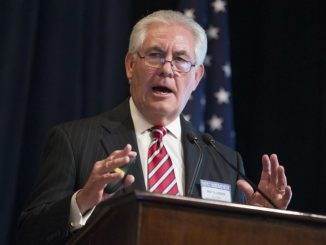Only few days passed on Aramco (Saudi company) decision to halt the oil supply to Egypt, then the latter started taking some political steps that ensures that the dispute between the two sides is deep and big, and that there is no turning back, said Al-Arabi 21 in an article by Hussein Abdul-Aziz that was titled: “Egypt Outside the Arab Consensus”.
Among these steps were: First, Al-Sisi’s phone call with Haidar Al-Abadi to declare his support to the battle of Mosul, which means that Egypt gave its back to the Gulf and Saudi fears concerning the participation of the popular mobilization Shiite militia, Abdul-Aziz said in his article, adding that the second step was Cairo’s reception of Ali Mamlouk, one of the cornerstones of the Syrian regime, to negotiate security coordination in countering terrorism. The third step was Cairo’s readiness to receive a Houthi delegation, according to Egyptian leaks to the media close to Iran.
Abdul-Aziz added that Egypt’s move also included the joint military exercises between Egypt and Russia that infer Egypt’s support of Russia’s military role in Syria. Also, the Egyptian media close to the regime talked about the existence of an Iranian offer to supply Egypt with oil instead of the halted oil supply from Saudi Arabia.
“This is not talk about Egypt’s reaction to the kingdom’s decision, but it is a manifestation of Egypt’s divergence from the Saudi stance regarding sensitive issues in the region. What prevented Cairo previously from expressing its stance explicitly is the relationship with Riyadh, particularly the large financial support offered to al-Sisi from the Kingdom. But al-Sisi, who is haunted by fighting the Muslim Brotherhood on one hand, rejecting the Arab Spring on the other hand, needs to find a regional and international umbrella to support his fight against “terrorism” to sustain his regime, instead of the Gulf,” according to Arabi21 article
However, the dispute between both countries isn’t tactical but it is a tremendous strategic one as it is mainly on the fate of the Arab region as well as its political and social existence especially the Sunni political entity in the region.
One of the paradoxes of history that Egypt stands in a hostile line to the Saudi Arabian approach that defends the Arab nationalist depth and the Sunni presence in the region.
Egypt of al-Sisi stands today in the Iranian-Russian axis completely through its hostility to all the Arab Spring revolutions and its explicit support to the authoritarian regimes, as well as the strong relationship that is almost close to an alliance with the Israeli occupation.
In fact, Egypt’s relations with all these parties is not based on an equal relation that reflects the national interests of both sides, but in fact Egypt is mainly obeying the orders in these files.
Through these policies, al- Sisi is dropping Egypt’s Arab national dimension from the Egyptian calculations, such as his stance in supporting the Russian-Iranian axis in Syria, without giving interest to the danger of Syria’s falling under the Shiite control, and the collapse of the Sunni influence there.
In addition, al-Sisi also neglected the long history of the Sunni doctrine that has shaped identity of the Kingdom during the past decades, through the participation of Egypt in Grozny conference which took place in Chechnya capital, under the title: “Who are Ahl al-Sunna and the Gamaa,” excluding the “Wahhabists” in Saudi Arabia this definition.
Finally, he participated in targeting the Syrian revolution and its military force through his support of the Russian-Iranian resolution on Aleppo city, under the false title known as the “humanitarian truce”.



